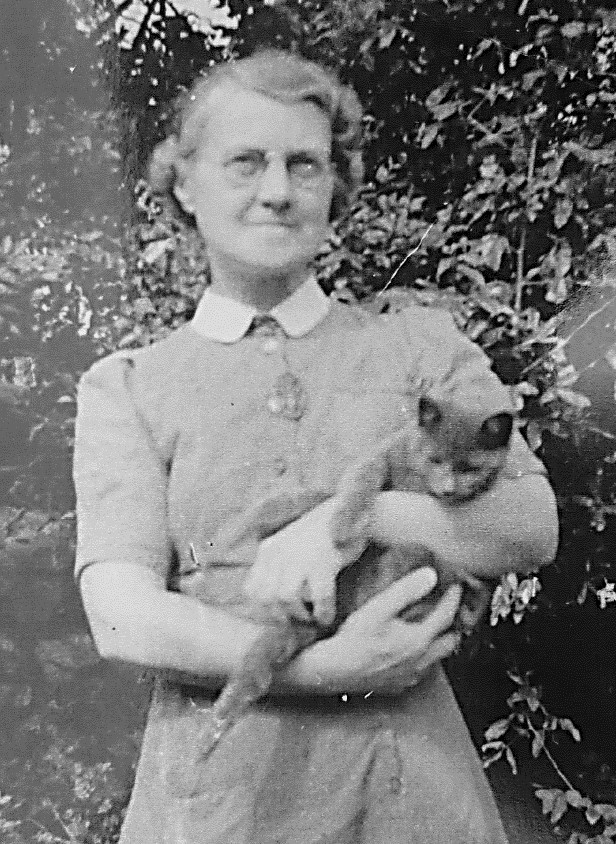This fascinating history profile tells the story of Nurse Ethel Hawksworth (1896-1987), a dedicated Queen’s Nurse who served the Tickhill community in South Yorkshire for 28 years until her retirement in 1956.
Commissioned by the Tickhill and District Local History Society, the profile is written by local historian Hazel Moffat. It provides a detailed account of Nurse Hawksworth’s life, from her early struggles after losing her father and brother, to her extensive training to become a highly qualified district nurse and midwife. The profile chronicles her long career working for the Tickhill District Nursing Association and later the NHS, attending over a thousand visits a year and delivering numerous babies in the area. Enriched with personal memories, photographs and archival records, it offers a vivid glimpse into the life and work of this remarkable Queen’s Nurse who left a lasting impact on Tickhill through her selfless service.
Nurse Hawksworth’s family
Born on 1 July 1896, Ethel Hawksworth was the second child of Mary Catherine, daughter of a blacksmith, and James Hawksworth, son of a miner. She had an older brother Harry born in 1894. The family lived at Spring Cottages, Calder Grove, Crigglestone to the southwest of Wakefield. James was employed as a hewer at Crigglestone colliery and when Harry left school he became an assistant banksman working on the surface at the colliery. Ethel went to school at nearby Painthorpe.
By the time she was 20 years old Ethel had lost both her father and her brother. Her father went to work as usual at Crigglestone colliery on Thursday, 14 October 1915. While working on the Woodmoor seam he had a fall and died. An inquest the next day recorded that he died from hypertrophy of the left ventricle of his heart: a sudden and shocking end for his family and his workmates.
Ethel’s brother enlisted in the 6th Battalion of the King’s Own Yorkshire Light Infantry, formed at Pontefract on 12 August 1914, just a few miles from Harry’s home. The 6th Battalion crossed to Boulogne on 21 May 1915. The following year it was engaged in fighting along the Somme. Harry, by then a Lance Corporal, was wounded so severely he could not be repatriated and would have been most likely cared for in No. 21 Casualty Clearing Station at La Neuville, Corbie, a village a few miles east of Amiens. Harry died on 18 September 1916 from his wounds. He was buried in the British Cemetery at La Neuville with 865 other British and Commonwealth troops, his grave has a headstone provided by the Commonwealth War Graves Commission. A few months later in April 1917 Harry’s mother was awarded a lifetime pension of 9s 6d a week in recognition of her son’s sacrifice. Harry’s Pension Record Card also shows that Ethel and her mother were awarded £6 each in 1919. Harry’s name is included on Crigglestone’s War Memorial.
Two years after Harry’s death the Wakefield Express carried an In Memoriam notice on 21 September 1918, p.7: In ever loving memory of Lance Corporal H Hawksworth, only son of the late James Hawksworth and Mrs Hawksworth of Calder Grove who died of wounds in France September 18 1916. From mother and sister. Also of James Hawksworth who passed away October 14 1915. From wife and daughter. The pain of both losses was considerable.
These two losses help to explain why Ethel’s mother lived with her during her early nursing career and why she lived with her in Tickhill, effectively looking after the house while Ethel went about her work. In the 1939 Register Mary Hawksworth, aged 79, was described as housekeeper at 5 Common Lane, Ethel’s home for many years. Mary died aged 88 on 8 February 1948 following a fall at home and resulting pneumonia while at Doncaster Royal Infirmary. She was buried with her husband near Wakefield on 11 February.
For Ethel nursing was a lifelong vocation. She became a highly qualified district nurse and, from 1928, for the rest of her career, she was based in Tickhill. The following pages explain her training and work experience from 1919 before she moved to Tickhill. Then the focus is on her employer, the Tickhill District Nursing Association, before, on 5 July 1948, the National Health Service came into being. The range of Ethel’s work in Tickhill is outlined and finally there is a section on her retirement. The Paper ends with some memories of Nurse Hawksworth, the name which will be used for the rest of this Paper.
